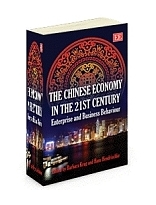Barbara Krug and Hans Hendrischke have knowledgeably compiled and deftly co-edited an
exploration of recent and on-going developments in China as reflected by the establishment
of private enterprise businesses and companies, developed knowledge based industries, and
evolved a kind of partnership between the institutions of government and business. A
seminal work, The Chinese Economy in the 21st Century is very strongly recommended for
inclusion in professional, corporate, academic, and governmental International Economics
reference collections in general, and contemporary Chinese studies economic supplemental
reading lists in particular.’
– Library Bookwatch, Midwest Book Review
‘What emerges in this book is a complex, layered, intriguing and ultimately informative
and insightful portrayal of a radically renovated business environment in contemporary
China.’
– David Ip, Pacific Affairs
‘A creative and wide-ranging collection on enterprise and business
behavior in today’s China. Using sociological and historical as well as
economic analysis, the individual chapters provide insights into
different aspects of China’s transitional economy as it continues to
undergo dynamic change. Recommended for academics and practitioners
interested in the forms and dynamics of Chinese business behavior.’
– Frederick C. Teiwes, The University of Sydney, Australia
China’s long-term economic success is driven by new firms, new sectors and
new business practices. This book explores the establishment of new private firms and
listed companies, the development of knowledge industries, in particular the IT and
banking sectors and the co-evolution of public governance and business institutions.
The contributors discuss the role of local institutions in coordinating business
activities and unleashing entrepreneurship, arguing that the sudden growth of new firms
and industries is facilitated by changes in business behaviour and institutions. Initial
private exchange and investment in an environment of ill-functioning markets are shown to
depend on local networks and local business culture which, in turn, rely on local tax
regimes setting incentives for inherited bureaucracies to engage in economic
transformation. Finally, the book establishes local institutions and local governance as
crucial dimensions of China’s emerging business system.
Contributing to the theory of endogenous institutional change, The Chinese Economy in the
21st Century will be of great appeal to academics and students interested in management,
comparative business systems, transition economics, evolutionary economics, Chinese
studies and Asian studies.
Edited by Barbara Krug, Professor for Economics of Governance, Rotterdam School of
Management (RSM), Erasmus University Rotterdam, The Netherlands and Hans Hendrischke,
Associate Professor in Chinese Studies, University of New South Wales, Sydney, Australia
Contents:
Preface
1. Going Public Without the Public: Between Political Governance and Corporate
Governance
Sonja Opper
2. Institutional Change, Diversity and Competition: Foreign Banks in Shanghai,
1847–2004
Jeroen Kuilman
3. Foreign Firms in China: Success by Strategic Choices
Xueyuan Zhang and Patrick Reinmoeller
4. The New Great Leap: The Rise of China’s ICT Industry
Mark Joannes Greeven
5. Enterprise Ground Zero in China
Barbara Krug
6. China’s Emerging Tax Regime: Local Tax Farming and Central Tax Bureaucracy
Ze Zhu and Barbara Krug
7. Narratives of Change: Culture and Local Economic Development
David S.G. Goodman
8. Networks as Business Networks
Hans Hendrischke
9. Whom are we Dealing With? Shifting Organisational Forms in China’s Business
Sector
Barbara Krug and Jeroen Kuilman
Index
264 pages, Paperback
Księgarnia nie działa. Nie odpowiadamy na pytania i nie realizujemy zamówien. Do odwolania !.


